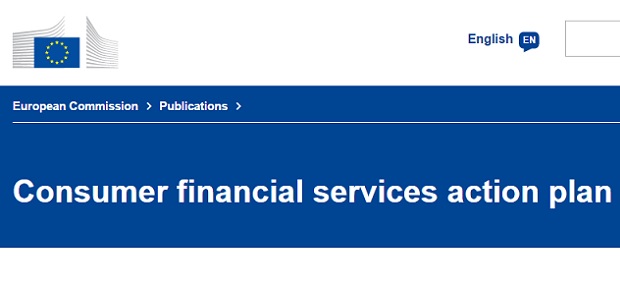The European Commision presents today the Consumer Financial Services Action Plan and launches a public consultation on Fintech

The European Commission EC) is today presenting The Consumer Financial Services Action Plan that seeks in particular to harness the potential of digitalisation and technological developments to improve consumer access to financial services across the EU. The focus is on technology, given that innovative online services will drive progress towards a more integrated market for financial services. To that end, EC is also publishing a consultation on technology and its impact on the European financial services sector (so called ‘FinTech’).
The consultation seeks input from stakeholders to further develop the Commission’s policy approach towards technological innovation in financial services. It seeks input in terms of stakeholders’ perspectives on new technologies’ impact on the European financial services sector, both from the perspective of providers of financial services and consumers, and whether the regulatory and supervisory framework fosters technological innovation in line with its three core principles of technologic neutrality, proportionality and integrity.
„President Juncker’s Commission has committed to developing a deeper and fairer Single Market, including through digital means. In terms of financial services, this means enhancing competition and improving choice so that consumers can enjoy lower prices and better quality, regardless of whether or not they shop abroad for financial services such as bank accounts, car insurance and money transfers.”, according to the press release.
This Action Plan seeks to prise open national barriers as only 7% of consumers currently buy financial services from another EU Member State. All consumers should be able to choose freely from a wide range of financial services available across the EU and get the best value for their money while being confident that they are well protected. In a true Single Market, the distinction between domestic and foreign providers should no longer matter. Financial service providers should also be able to reap the benefits of the EU’s entire market.
Valdis Dombrovskis, Vice-President responsible for Financial Stability, Financial Services and Capital Markets Union, said: „Consumers should have access to the best products available across the EU, not just within their own country. At the same time, we want to explore the full potential of the technology that’s out there. If harnessed well, it has the potential to change for the better the financial industry and the way people access financial services.”
Jyrki Katainen, Vice-President for Jobs, Growth, Investment and Competitiveness said: „This ambitious Action Plan presents targeted measures that will gradually deepen our Single Market and have a real impact on the lives of European citizens.”
Věra Jourová, Commissioner for Justice, Consumers and Gender Equality said, “While the right to move freely within the EU continues to be the most cherished right of Europeans, consumers in the EU are still experiencing too many barriers in their daily lives. Be it when opening a bank account, when buying car insurance or asking for credit: as soon as there is a cross-border dimension, things get complicated. Today we map out a plan to give consumers better products and more choice, improving clarity and protection of financial services.”
The Action Plan
The Commission has identified three main strands of further work to move a step closer to a genuine Single Market for financial services:
Increase consumer trust and empower consumers when buying services at home or from other Member States. Among other things, we want to make it easier for drivers to take their no-claims bonus (‘bonus-malus’) abroad. We also want to reduce fees for cross-border transactions involving non-Euro currencies and we will be taking steps towards more transparent pricing of car rental insurance.
Reduce legal and regulatory obstacles affecting businesses when seeking to expand abroad. This will include working on common creditworthiness assessment criteria and facilitating the exchange of data between credit registers.
Support the development of an innovative digital world which can overcome some of the existing barriers to the Single Market.
„We will work with the private sector to explore how they could use electronic identification and trust services for checking the identity of customers. We will also monitor the practices of digital providers to decide if rules for selling financial services remotely – such an online or by phone – should be updated.”, Commission say.
The Commission has already tackled many of the regulatory obstacles to the Single Market in consumer financial services through EU legislation. Today’s Action Plan sets out a roadmap for further work. Many of the actions will need to involve stakeholders such as national supervisory authorities, service providers and consumer organisations.
FinTech: the new frontier in financial services
The speedy development of FinTech brings new opportunities for both consumers and companies. It has the potential to improve consumers’ access to financial services across the Single Market, open up national barriers and improve efficiency.
In order to help the European FinTech sector operate freely across the EU and be competitive, the Commission intends to focus on three core principles: technology-neutrality, so that the same rules are applied to traditionally-sold products and services (e.g. via branches) as those sold digitally; this is to ensure innovation and a level-playing field. Second, proportionality so that the rules are suitable for different business models, size and activities of the regulated entities. Third, improved integrity to ensure transparency, privacy and security for consumers.
As a first step, the Commission invites all interested parties to respond to the FinTech consultation, which is being launched alongside the #FinTechEU conference taking place in Brussels today. The consultation aims to gather first-hand information on the impact of new technology on the entire financial sector. It will help to assess whether EU regulatory and supervisory rules are adequate and what future actions may be needed.
Background
The EU has already taken a number of measures to achieve a Single Market in consumer financial services. These include the Payment Accounts Directive, which improves the transparency of bank account fees and make it easier to switch bank accounts, and the Commission’s Digital Single Market Strategy, which seeks to boost access to digital products and services. In its Action Plan on Building a Capital Markets Union, the Commission committed to developing stronger capital markets across the EU and also to improving access to retail investment products.
To identify remaining barriers, the European Commission launched a Green Paper consultation on Consumer Financial Services in December 2015. The consultation looked at the consumer financial services market across Europe for products such as insurance, mortgages, loans, payments and bank accounts. In parallel, a Special Eurobarometer survey was also launched to collect more evidence on the consumer financial services market.
The Green Paper received 428 contributions from a wide range of stakeholders (consumers, consumer organisations, financial industry and competent authorities) and it made clear that the barriers to the functioning of the Single Market affect both consumers and providers.
Source: European Commission
Dariusz Mazurkiewicz – CEO at BLIK Polish Payment Standard
Banking 4.0 – „how was the experience for you”
„To be honest I think that Sinaia, your conference, is much better then Davos.”
Many more interesting quotes in the video below:









